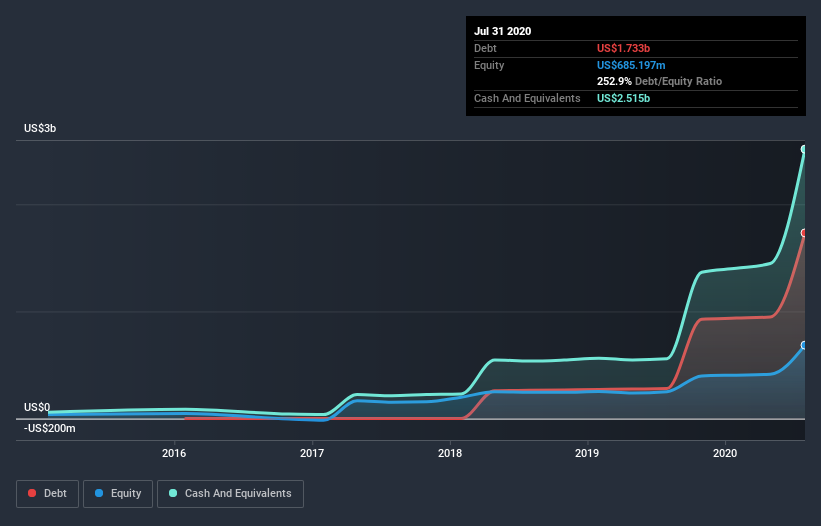Is Okta (NASDAQ:OKTA) Using Too Much Debt?

David Iben put it well when he said, 'Volatility is not a risk we care about. What we care about is avoiding the permanent loss of capital.' So it might be obvious that you need to consider debt, when you think about how risky any given stock is, because too much debt can sink a company. We can see that Okta, Inc. (NASDAQ:OKTA) does use debt in its business. But the more important question is: how much risk is that debt creating?
Why Does Debt Bring Risk?
Debt is a tool to help businesses grow, but if a business is incapable of paying off its lenders, then it exists at their mercy. Ultimately, if the company can't fulfill its legal obligations to repay debt, shareholders could walk away with nothing. However, a more common (but still painful) scenario is that it has to raise new equity capital at a low price, thus permanently diluting shareholders. Of course, plenty of companies use debt to fund growth, without any negative consequences. When we think about a company's use of debt, we first look at cash and debt together.
Check out our latest analysis for Okta
What Is Okta's Debt?
As you can see below, at the end of July 2020, Okta had US$1.73b of debt, up from US$279.7m a year ago. Click the image for more detail. However, its balance sheet shows it holds US$2.51b in cash, so it actually has US$781.5m net cash.
How Healthy Is Okta's Balance Sheet?
The latest balance sheet data shows that Okta had liabilities of US$533.6m due within a year, and liabilities of US$1.90b falling due after that. Offsetting these obligations, it had cash of US$2.51b as well as receivables valued at US$118.1m due within 12 months. So it can boast US$202.8m more liquid assets than total liabilities.
This state of affairs indicates that Okta's balance sheet looks quite solid, as its total liabilities are just about equal to its liquid assets. So while it's hard to imagine that the US$28.3b company is struggling for cash, we still think it's worth monitoring its balance sheet. Simply put, the fact that Okta has more cash than debt is arguably a good indication that it can manage its debt safely. When analysing debt levels, the balance sheet is the obvious place to start. But ultimately the future profitability of the business will decide if Okta can strengthen its balance sheet over time. So if you're focused on the future you can check out this free report showing analyst profit forecasts.
In the last year Okta wasn't profitable at an EBIT level, but managed to grow its revenue by 44%, to US$704m. Shareholders probably have their fingers crossed that it can grow its way to profits.
So How Risky Is Okta?
Although Okta had an earnings before interest and tax (EBIT) loss over the last twelve months, it generated positive free cash flow of US$64m. So although it is loss-making, it doesn't seem to have too much near-term balance sheet risk, keeping in mind the net cash. We think its revenue growth of 44% is a good sign. There's no doubt fast top line growth can cure all manner of ills, for a stock. The balance sheet is clearly the area to focus on when you are analysing debt. But ultimately, every company can contain risks that exist outside of the balance sheet. Be aware that Okta is showing 3 warning signs in our investment analysis , you should know about...
If you're interested in investing in businesses that can grow profits without the burden of debt, then check out this free list of growing businesses that have net cash on the balance sheet.
This article by Simply Wall St is general in nature. It does not constitute a recommendation to buy or sell any stock, and does not take account of your objectives, or your financial situation. We aim to bring you long-term focused analysis driven by fundamental data. Note that our analysis may not factor in the latest price-sensitive company announcements or qualitative material. Simply Wall St has no position in any stocks mentioned.
Have feedback on this article? Concerned about the content? Get in touch with us directly. Alternatively, email editorial-team@simplywallst.com.



